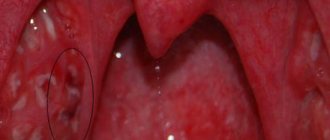- home
- —
- Oncology
- —
- Head and neck tumors
- —
- Palate cancer
Palate cancer is relatively rare and most often results from the process of metastasis of a primary site of another location, usually also located in the head and neck. The palate is located in the upper part of the oral cavity and separates it from the nasal and nasopharynx, divided into hard (bone part) and soft (mucous fold).
Risk factors include smoking, drinking alcohol, spicy and hot foods, tissue damage due to improperly installed dentures and crowns, inflammatory processes and diseases related to precancer (HPV, leukoplakia), as well as genetic predisposition, lack of vitamin A.
Classification and symptoms of cancer of the upper palate
Based on the tissues from which tumors develop, the following types are distinguished:
- cylidroma - made of glandular cells;
- squamous cell - cancer of the palate mucosa, about 90% of all cases;
- adenocarcinoma - from the epithelium.
In addition, cancer of the hard and soft palate is distinguished by location - the first affects bone tissue, the second - muscle and mucous membranes.
Diagnosis of palate cancer in Israel
Examinations for various forms of palate cancer include highly specific instrumental and laboratory tests.
Laboratory diagnostics include:
- General blood test with leukocyte count
- General urine analysis
- Biochemical blood test (level of bilirubin, glucose, creatinine)
- Detection of antibodies to HIV, Treponema pallidum and human papillomavirus
- Histological examination of a tissue sample
Instrumental diagnostics are represented by the following studies:
- Isotope labeled PET-CT
- MRI
- Oroscopy
- Pharyngoscopy
- Taking a sample of tumor tissue
- Vitropression (imprint of tumor cells on a glass slide)
The doctor examines the research results and announces all possible treatment options. The patient actively participates in the discussion and chooses the most acceptable option from those offered.
Hospitalization of cancer patients. Daily. Around the clock
9,500 patients trust us annually.
Call your doctor now!
Send documents by email The possibility of treatment will be considered by the chief physician of the clinic Anton Aleksandrovich Ivanov, oncologist-surgeon, kmn
The first sign that may indicate a malignant process is a slight compaction in any part of the palate. At this stage, it is recommended to consult a doctor for a diagnosis so that, if necessary, treatment can be started as early as possible. As the tumor grows, its structure and color changes, and the following appears:
- pain in the oral area, especially when chewing and swallowing, which can also be felt in the ears, cheekbones, and temples;
- violations of diction, slowing down the rate of speech, deepening of the voice;
- change in sense of taste;
- the appearance of bad breath;
- ulceration, bleeding of lips, cheeks, palate;
- common signs of cancer intoxication are fatigue, weakness, loss of appetite and weight, and constant fever.
If the neoplasm spreads, affecting other tissues and organs, fusion of the nasopharynx and oropharynx, changes in the jaw bones, etc. may occur.
Palate cancer: causes and symptoms
Neoplasms of the palate are represented by two main groups of neoplasms: squamous cell carcinoma and Kaposi's sarcoma. They differ in source of origin, but the clinic, nature of the course and approaches to treatment are almost identical.
Squamous cell carcinoma arises from the epithelial cells of the mucous membrane of the soft and hard palate. The following factors are highly likely to lead to the development of this disease:
- Long-term trauma to the tissues of the palate
- Contact with inhaled carcinogens (benzopyrene, pesticides)
- Smoking more than 20 cigarettes per day
- Infection with highly oncogenic strains of human papillomavirus
- Leukoplakia of the mucous membrane
Kaposi's sarcoma is formed by actively growing blood vessels and connective tissue. It has been established that the triggering factor for the development of such a neoplasm is a significant decrease in immunity; therefore, the following persons are at risk:
- HIV-infected patients with CD4 cell counts less than 200 U/mL
- Persons with congenital abnormalities of the immune system
If the patient belongs to one of the risk groups, special attention should be paid to a number of the following symptoms:
- The appearance of an ulcer on the tissues of the palate, a soft tissue growth of a whitish or bluish color
- Discharge of blood or pus from the tumor
- Pain, difficulty swallowing
- Swelling of the palate
- Nasality
- Impaired diction
- Enlarged cervical, parotid and submandibular lymph nodes
Identification of one or more of these symptoms is highly likely to indicate progression of the cancer process. To confirm or refute the diagnosis, you must contact a specialized specialist. Oncologists at the Ikhilov and Assuta clinics carry out all the necessary diagnostic tests in 1-3 days. This allows you to begin tumor treatment as soon as possible and achieve the best clinical results.
Stages of palate cancer
Traditionally, precancer and main stages are distinguished:
I - neoplasm up to 2 cm, other tissues are not affected;
II - up to 4 cm;
III - adjacent tissue layers and regional lymph nodes are affected;
IV - increase in size, germination into neighboring organs, metastasis to distant organs.
Since oncology of the palate often turns out to be secondary, as part of the diagnosis, studies are carried out to identify primary foci and assess how far the disease has progressed. They use visual examinations and palpation, blood tests, radiography, biopsy, radioisotope studies, ultrasound, MRI, CT, etc.
Benefits of treatment at Top Assuta
- High rating. Top Assuta Clinic is one of the best in Israel. Patients from all over the world come here for treatment. The high success rate of oral cancer therapy (96%) shows how effective the treatment in this clinic is.
- Highly accurate research. The clinic has its own diagnostic center, equipped with the latest equipment. The diagnostic accuracy is 100%.
- Innovative approach. Treatment of palate cancer in Israel involves the use of the newest, most progressive methods of therapy. They allow for effective, organ-preserving treatment and eliminate the likelihood of side effects.
- 5
- 4
- 3
- 2
- 1
(9 votes, average: 4.2 out of 5)
Treatment of palate cancer
Schemes and techniques are selected depending on the specific course of the disease and the patient’s condition. The main methods used are surgery, chemotherapy and radiotherapy, individually or in combination. When treated in the early stages, the five-year survival prognosis is about 80%, in the latter stages it is only 30%.
For diagnosis, treatment, and palliative care, you can contact the NACFF clinic. We also provide rehabilitation for cancer patients. To schedule an initial consultation, call tel. +7.
Prevention of oral cancer
It is impossible to be 100% insured against oral cancer, but quitting smoking and alcohol will help reduce the risk.
Risk factors:
- alcohol abuse,
- smoking,
- poor oral hygiene,
- constant injury to the mucous membrane in the same place (due to an acute chipped tooth or malocclusion).
Unfortunately, cancer can occur in a person who does not smoke, does not drink alcohol and performs all hygiene procedures. However, the above factors increase the likelihood of the formation of malignant tumors.
Oncological diseases at an early stage are much easier to cure than advanced forms, so it is important to regularly independently examine the oral mucosa and undergo regular examinations by a dentist.
Book your room today
6 seats
1 local ward
- 4 meals a day
- Bathroom in the room
- Anti-decubitus mattresses
- Nurse
6700 rub.
Book
13 places
2 local ward
- 4 meals a day
- Bathroom in the room
- Anti-decubitus mattresses
- Nurse
4200 rub.
Book
2 seats
VIP chamber
- a guest room
- 4 meals a day
- Bathroom in the room
- Anti-decubitus mattresses
- Nurse
16200 rub.
Book
6 seats
1 local ward
- 4 meals a day
- Bathroom in the room
- Anti-decubitus mattresses
- Nurse
6700 rub.
Book
13 places
2 local ward
- 4 meals a day
- Bathroom in the room
- Anti-decubitus mattresses
- Nurse
4200 rub.
Book
2 seats
VIP chamber
- a guest room
- 4 meals a day
- Bathroom in the room
- Anti-decubitus mattresses
- Nurse
16200 rub.
Book
Symptoms
Most often, neoplasms of this type are observed in men 40-60 years old.
Throat cancer is difficult to determine at an early stage, since the symptoms are very similar to a common cold. The patient may feel:
- aching sore throat;
- swelling in the neck area;
- difficulty swallowing food;
- voice change.
If you ignore the symptoms of cancer at the initial stage, then it can manifest itself in the form of:
- sharp pain in the throat that even strong painkillers cannot relieve;
- enlarged lymph nodes;
- cough with bloody discharge;
- weakness, high temperature;
- strong bad breath.
At the first symptoms of a malignant tumor of the throat, you should immediately contact an appropriate specialist.
Reviews
23.04.2021
“I was surrounded by care, love and relieved of pain!”
16.04.2021
Feedback from a patient at the NACFF clinic after surgery
14.04.2021
Mass in the transverse colon
05.03.2021
Colon and rectosigmoid cancer
View all reviews
Hospital, hospitalization, emergency medical care - 24/7, 7 days a week
+7 (495) 259-44-44
Diagnosis of cancer of the soft and hard palate
The resulting cancerous tumor of the palate is difficult to determine independently in the early stages. If the pathological process has affected large areas of the soft or hard palate, a preliminary diagnosis can be made after a visual examination of the oral cavity.
To confirm the diagnosis, oncologists at the Yusupov Hospital perform the following diagnostic procedures:
- X-ray – finds pathological changes in bone tissues adjacent to the oral cavity;
- Biopsy – taking a piece of tissue for histological examination (analysis is necessary to identify altered tumor cells and its type);
- Blood tests - signs of anemia;
- Radioisotope examination - allows you to examine the structure of the neoplasm.
Ultrasound examination is carried out to detect cancer metastases in distant organs. Patients of the Yusupov Hospital can undergo complex diagnostic procedures in partner clinics and receive advice from leading dental oncologists in Moscow.
Possibilities of treatment of the last stages of throat cancer in medical
Medical in Turkey (Anadolu Medical Center) is a partner of the world famous Johns Hopkins Medicine in Baltimore (USA) and has a network of representative offices in the regions of Russia and the CIS countries.
Treatment of late-stage cancer is one of the main specializations of the center. He has many years of experience in this area.
Highly qualified staff and world-renowned doctors provide competent diagnosis, treatment and high-quality rehabilitation necessary for patients with serious illnesses and after major surgical interventions.
Prices for world-class medical care in Turkey are 20-30% lower than in Israeli and American clinics. This is due to the center's non-profit status and higher government funding for the medical industry.
The use of advanced technologies and the most modern equipment, the availability of convenient accommodation options for foreign patients makes it attractive for patients who are considering the option of treating throat cancer abroad, especially in case of late diagnosis.
Numerous grateful reviews of treatment received from patients and their relatives clearly demonstrate the high qualifications of the staff and care for patients.
Sign up for a consultation
Order a call back on the website, make a request for treatment and prices, or call us (toll-free within the Russian Federation).
The material was prepared in agreement with medical doctor, Professor Sertach Yetisher.
How to determine the presence of laryngeal cancer?
There are many methods for diagnosing throat cancer. However, before deeper studies, each patient must undergo a visual examination by a specialist and palpation of the neck. The patient’s complaints play an important role in making a diagnosis; they can be used to understand the location of the tumor and the stage of development. All this is important so that a specialist can predict the subsequent development of the tumor.
If the patient feels a lump in the throat and pain when swallowing, then the tumor may be in the vestibular area of the larynx.
When these symptoms are accompanied by pain in the ear, it can be assumed that the neoplasm is located on the lateral wall of the throat on one side. Voice deformation indicates pathology of the vocal tract.
Thus, based on various symptoms, the exact location of the lesion can be determined.
The next informative method is neck palpation, which allows:
- assess the configuration and volume of the tumor;
- determine its displacement relative to neighboring tissues;
- by listening to the patient's breathing and voice, watch out for possible symptoms of stenosis and dysphonia. The patient needs detailed palpation of the lymph nodes.
Laryngeal cancer can metastasize to all lymph nodes. To make a final diagnosis, a general medical examination should be performed.











